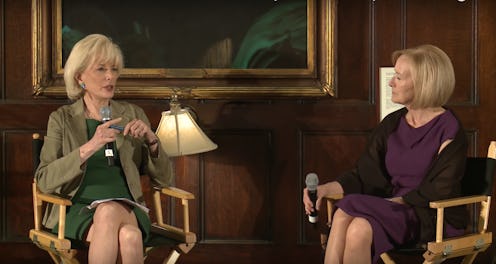News
The Reason Why Trump Reportedly Attacks The Press Is Exactly What They Were Afraid Of
President Donald Trump's loathing of the press is so legendary that the 45th commander-in-chief has even been able drop his own term into the mainstream stratosphere: fake news. The expression has become an anthem for many Trump loyalists who dislike media coverage that may cast Trump in a negative light. And while we're familiar with his diatribes against the evils of the fourth estate, it's never really been explicitly clear why he hates the press so much. However, a recent claim from CBS News' Lesley Stahl may explain why Trump attacks the media so fervently and so frequently.
During the Deadline Club Awards dinner at the Harvard Club in Manhattan on Monday night, Stahl spoke to a crowded room of journalists, sharing a supposed exchange she had with the president in November 2016, shortly before his first post-election interview on 60 Minutes. Stahl revealed that she had been prepping for the interview with the then-president-elect at Trump Tower. Stahl, who was there with her boss, had been talking to Trump when, at one point, he launched into a tirade against the press. Stahl said she then asked him why he kept ripping into the media.
"That is getting tired," Stahl said, as she recalled the conversation with Trump to PBS’ Judy Woodruff on stage. “Why do you keep hammering at this?”
According to Stahl, Trump replied, “You know why I do it? I do it to discredit you all and demean you all, so when you write negative stories about me, no one will believe you.”
A wave of murmurs ran through the Deadline Club crowd before Stahl finished with, "He said that. So put that in your head for a minute."
Woodruff looked shocked and was silent for a moment before she offered, “We’re all absorbing what you just said.”
Bustle has reached out to the White House for comment on Stahl's claims.
Stahl remembers this moment with Trump in the video at 21:22.
These claims about Stahl's off-camera moment with Trump have made their way through social media. Many interpret the anecdote as confirmation that the president's habitual attacks on the media are part of a bigger, deliberate political move — to manipulate the public's perception of him.
The administration's frosty relationship with the press has been on display since his campaign days. Just this week, for example, the Environmental Protection Agency, led by Scott Pruitt, barred several news organizations, including the Associated Press, CNN, and a trade outlet reporter from E&E from coming in to a national summit on harmful water contaminants, according to the AP.
According to New York Magazine, a security guard at one point grabbed and forcibly removed Associated Press reporter Ellen Knickmeyer from the EPA building after she tried to go through a security checkpoint. "This was simply an issue of the room reaching capacity, which reporters were aware of prior to the event," an EPA spokesperson told NBC News. According to the outlet, some reporters who were permitted to go in to the meeting said there were some open seats left for press, despite what the EPA spokesman said.
Trump's abrasive approach toward the press has been well-documented since the beginning of his political career. He's called the press "disgusting" for writing "whatever they want to write," and has said some outlets are the "enemy of the American people," according to the New York Times.
Then, there was also the time he targeted NBC by threatening to use the federal government's power to possibly revoke their television license. “Network news has become so partisan, distorted and fake that licenses must be challenged and, if appropriate, revoked,” Mr. Trump tweeted on Oct. 11, 2017. “Not fair to public!”
With all the accusations of fake news and mealy-mouthed lies, there was one transparent thing that Stahl took note of during her interview with the president: Trump's demeanor. "He really is the same off-camera that he is on-camera," said Stahl. "Exactly the same."
